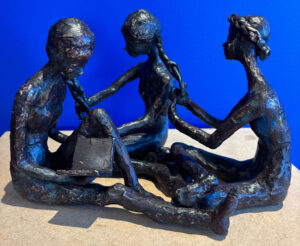Select Other Languages French.
Dear Souseh,
I’m from Lebanon, where commenting on people’s weight is just part of our identity, as elemental as Fairouz and bulghur. I’ve always hated that, and it partially motivated my moving to the other corner of the planet. But when I come back to visit Lebanon and my parents, the “old ways” overrule modern sensitivities, and discussion of my weight is fair game. My mother will tell me to avoid that next cookie, “or do you want to end up looking like Marlon Brando?” When people gift us sweets, she will hide them from me. She says these things in front of my wife and kids, disrupting our parenting choices of never commenting on other people’s appearances. Of course, my mother is also overweight. I think she sees this as tough love and an attempt to keep me from having the same health struggles as she does. I know I’m being overly sensitive, and she only means well, but boy does it ruin my day. I’ve talked to her directly about it but she’s unable and unwilling to change.
Can you offer anything that might help me through this time at home?
Signed,
Shamed by the Motherland
Dear Shamed by the Motherland,
I’ve always found it curious how many people believe that shame is some great motivator for self-improvement.
It’s a form of chastisement to be sure, of social punishment, especially in these Arabic-speaking regions of ours. I’m sure you’ve heard of this designation that cultural anthropologists make, of shame-based cultures vs guilt-based cultures vs fear-based cultures. It’s about the way that different cultures discipline their members into social cohesion, and this in turn produces and reinforces the collective values these cultures hold most dear. Virtue in exchange for an exercise of guilt, honor in exchange for shame. ‘Aib, we tell our children when they are rude to a guest; ya ‘aybishoom when they refuse to share their toys. Hell, we’re so motivated by shame we have a concept for both negative and positive shame: that beautiful word walaw, a palindrome in both Arabic and English transliteration, drawing a perfect circle, which at times can feel like a warm hug, at times like a constricting vise. A driver cuts you off on the road? Walaw — how could you? Have you no shame? A friend gets up stealthily to do the dishes after a dinner invite? Walaw — how could you? You’re my guest! I’ve seen my mother literally wrestle the dish sponge from her friend’s hands while tutting walaw and ya ‘aibishoom the whole time, and both of them knew it was an expression of respect and love.
But shaming a person for their non-conforming body, especially when it is not in any way considered fat, is a practice that cuts across all cultures. Fat shaming brings the world together; it is the true international standard on which the whole world can agree. In fact, one doesn’t have to be in any way fat to be shamed — the mere act of eating something (cookies) or in a way (too much) to make you fat is enough to be shamed for the act of eating itself.
These two things are inextricable from one another because the vilification of fat is on some level a vilification of the appetite itself. Gluttony, after all, is one of the seven deadly sins in Christianity, which tells us less about gluttony and more about the way in which appetite, undisciplined appetite, is perceived: a sin of desire, equal to lust and greed. Thus, to wear evidence of your appetite on your body is an admission of sin. That’s why shame and guilt are so tied up with food. Because fat is seen as a moral issue. To be fat is to suffer from moral weakness. It’s why some foods are considered good (though “clean” is now considered the more in-vogue word, as though that changes anything about the moral connotation) and others bad. It’s why someone, eating within their restricted calorie count for the day, can say, “today I was good,” and another, taking an extra helping of ice cream might wink at the table and say, “today I’m being naughty.” Of course, it’s only a thin person who can get away with presenting indulgence as some kind of adorable mischief. A fat person is more likely to say nothing when taking that extra helping, or to preempt judgment by publicly acknowledging their sin — “I know it’s bad, but…” — or decline it altogether only to go home and have ice cream in secret, because they have accepted the covenant of shame.
What complicates all of this is that food is entangled with so many other things. Food is love, food is culture, food is heritage. I’m sure when you come back to visit, your mother makes a big deal about cooking all your favorite things. I’m sure she gets upset if her grandchildren don’t eat enough of what she’s made them, or if they express distaste for the foods of the homeland. And so, food is one of the ways she expresses her love. But so is her admonishing you for eating “wrong.” How confusing and upsetting is that?
I will wager and say, though, that when your mother admonishes you for eating, it’s not “tough love” so much as the culture at large speaking through her. It is whatever discipline she has had to exact on herself her entire life as a woman, which means in a body whose every expression has been mercilessly scrutinized. It is her own shame speaking. Or rather, she’s speaking to you in the voice she uses to shame herself, trying to discipline herself into a body that conforms to what the culture deems acceptable. Whether she’s overweight or not is beside the point: women especially are trained to hate and find their bodies unacceptable at any weight, any size. We are trained to think of ourselves as objects whose main function is to inspire desire, and thus our own desires must be tamed, sometimes altogether snuffed out, to maintain the stillness of an object. This is what the world teaches us to be. And with the increasing prevalence of images, of image as the main representative of reality, this self-perception is spreading to young men as well.
Now, this doesn’t change how enraging it is to hear her admonishments. In fact on some level it might make the anger worse, because your mother is supposed to protect you from the ravages of the world (which I’m sure is what she thinks she’s doing), and because any perceived failure of love or acceptance — especially on our parent’s part — is a trigger for all kinds of furious emotion.
And of course, the fundamental reason her words ruin your day is likely because they play on your own self-loathing over your body, which has been inculcated into you, into all of us, since we could understand language, and maybe even from before. You’re not being overly sensitive. It’s horrible, especially when in the supposedly safe shelter of home, to be reminded of all the myriad ways the world tells you to hate your body; for its color, its shape, its size, its level of ability, its ailments and illnesses, its sexuality and sexual expression. There is no detail that escapes that scrutiny: the very shape of one’s features, including even fingers and nails and toes, skin texture, hair texture, body hair in general, fat distribution, muscle mass… I could go on and on and on.
For your kids, watching your mother shame you is just one more way that they’re taking in these cultural signals, one more confirmation of the idea that their bodies are objects of judgment and thus potentially worthy of disdain. You know this very well, which is why you’ve made the parenting choice of never commenting on anyone’s appearance.
You won’t be able to change your mother. You’ve tried talking to her and she is, as you said, “unwilling and unable to change.” But you can talk to your kids. If they’re old enough, you can use this as an opportunity to have a more in-depth conversation with them about the subject. In northern Europe and North America, modern sensitivities, as you call them (and this is only a general rule, which I must point out is also often broken), preclude people from openly commenting on one another’s bodies. It doesn’t mean they’re any less judgmental of them. This merits continuous discussion with kids about their bodies, about how their bodies are not owed to the world but essentially belong to them. You cannot ensure that your kids will always feel comfortable in their own skins because, sadly, it’s not up to you. But it will help them to know the forces arrayed against them, and it will help to keep hearing that they have full ownership over their bodies, which includes, to a certain extent, how they define them, how they feel about them, and whose opinions they allow to matter and how. It’s one of the most important things you can teach them. Because even if they manage to conform, more or less, to beauty standards for the entire brief period of acceptable youth, their bodies will age, and change, and wrinkle. There is no escaping that. They might even (la samah allah) be subject to life-altering injuries. They will have to know how to adjust and adapt to every change because our bodies are, as a poet friend of mine so beautifully put it, the only real homes any of us will have in the world.
How does one break the cycle of body shaming? Well, how does one throw off any tyranny? Through nothing less than revolution. To love and cherish your body in a culture that reviles it, that reviles all bodies above all for being material, subject to illness, to age is a revolutionary act. I truly think that we hate bodies – are taught to hate our bodies – because their decline over time reminds us that we will die, and so we try to discipline and tame them in all sorts of ways to give us a sense of control over them. It really feels that simple to me. When in reality there are things we can control and things we can’t and even the line between those two things is blurred; it is unclear where it actually lies.
Self-love is a discipline, but a generous one, one that comes from a place of acceptance rather than restriction. As such it is the only discipline that can be used to counter the discipline of self-negation enforced by shame. And it is a much bigger motivator to treat yourself right than shame. To think of your body as a whole, as a home, means trying to find balance. Notice I haven’t used the word “health” once in this whole response. That’s because health can so quickly become the cloak we throw on to disguise that moralizing, shaming hatred of the unconforming body. And so we must try to love our bodies in actionable ways. This means enjoying the sensual pleasures they afford – that include eating delicious food – and also listening to how our bodies feel. For example, I might love ice cream, but because I’m lactose intolerant, if I have too much of it, it hurts my stomach. So over time and with practice I’ve learned how much I can have to enjoy the pleasure of ice cream without getting to the pain part. Sometimes I miscalculate and spend the night doubled-over in pain. Oh well. It’s not an exact science, but nothing about life is.
All of this is easier said than done, I know. How do you then practice self-acceptance the next time your mother admonishes you over a cookie or your body in general? Ignore her, don’t respond, walk away if need be. Grit your teeth and remind yourself that soon enough you’ll be back in the home you’ve made for yourself and your family, where you’ll be able to eat as many damned cookies as you please.
And then go ahead and eat those cookies without guilt or shame.













